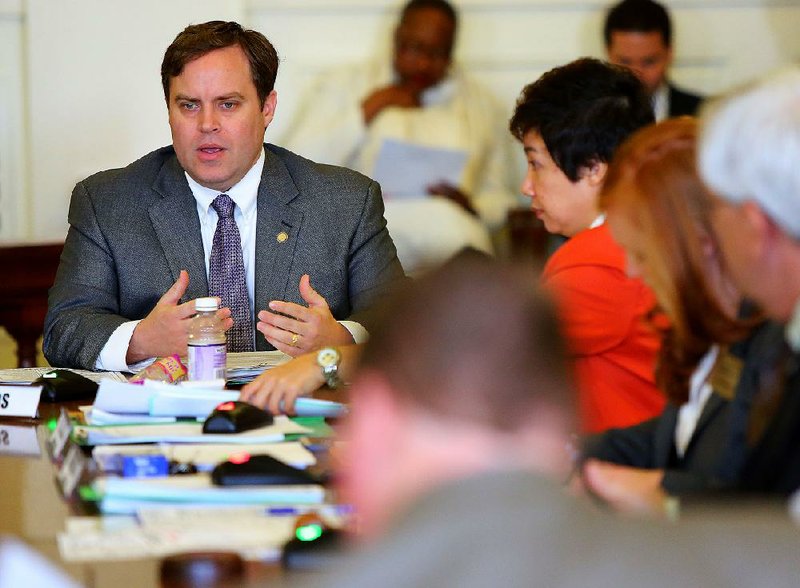An Arkansas Senate committee Tuesday backed legislation allowing a state official who unintentionally accepts a prohibited gift from a lobbyist to return the gift to the donor within 30 days of learning about the violation and not be sanctioned by the state Ethics Commission.
If the prohibited gift is not returnable, the state official could pay the donor "consideration that is equal to or greater than the value of the gift" within those 30 days without penalty under Senate Bill 967 by Sen. Jon Woods, R-Springdale.
The Arkansas Ethics Commission would be barred from proceeding with an investigation in these cases, and the person "shall not be considered to have committed a violation" under the proposal.
Woods told the Senate State Agencies and Governmental Affairs Committee that his bill is aimed at helping implement Amendment 94 to the Arkansas Constitution, which voters approved in November.
He said several state lawmakers suggested creating a "30-day cure period" to fix their ethics errors because there is a similar period in federal law applying to U.S. congressmen and senators.
"I am trying to protect my colleagues and eliminate silly gotchas," Woods said.
Many ethics complaints filed against lawmakers are "petty," and he wants the commission to investigate "serious accusations and serious complaints and serious violations and not minor technicalities."
Amendment 94 extended term limits for lawmakers; barred them from accepting certain gifts from lobbyists, including food and drink in one-on-one meetings; prohibited direct campaign contributions from unions and corporations to state elected officials; and created a citizens commission to increase the salaries of state elected officials.
The bill would increase the $2,000-per-election contribution limit to state candidates from individuals, political parties, legislative caucus committees and political action committees to $2,700 per election. The limit also would be adjusted for inflation at the start of each odd-numbered year.
SB967 would extend the ban on state lawmakers and constitutional officers accepting certain gifts from lobbyists to members of the state Supreme Court and Court of Appeals, circuit and district judges, and prosecutors.
It would specify that the food and drink that lawmakers may accept at a planned activity to which a legislative committee is invited could be accepted by only members of that committee. All lawmakers also may be invited to a planned activity under Amendment 94.
The bill would define a planned activity as "an event for which a written invitation is distributed electronically or by other means by the lobbyist, person acting on behalf of a lobbyist or the person employing or contracting with a lobbyist to members of the specific governmental body at least 24 hours before the event."
But it would limit a lobbyist, a person acting on behalf of a lobbyist, or a person employing or contracting with a lobbyist to pay for food or drink at no more than one planned activity in a seven-day period.
It also would exempt from the gift ban a personalized award, plaque or trophy with a value of $150 or less.
The legislation also would bar a candidate or elected official from displaying one or more campaign banners, campaign signs or other campaign literature larger than 12 inches by 12 inches on a car, truck, tractor or other vehicle belonging to the candidate or public official while on the state Capitol grounds.
Sen. David Burnett, D-Osceola, said the provision would require some vehicles parked at the state Capitol that are extensively painted to get a new paint job, and he wondered what's the purpose of it. He said it appeared aimed at a few constitutional officers.
Woods replied that the state Capitol grounds are "a place for policy, conducting the people's business and not a campaign [area]."

